44th Annual North Carolina Turkey Industry Days
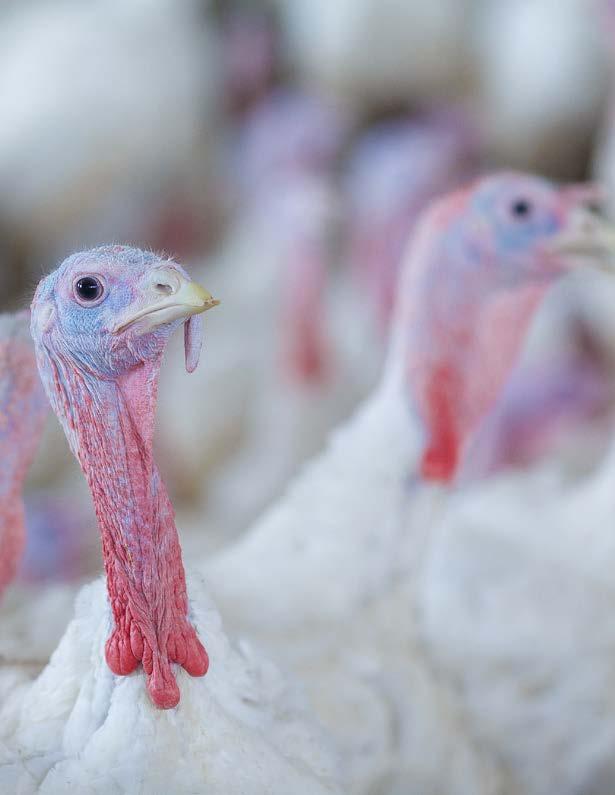
November
2022 Hotel Ballast Wilmington, Tapestry Collection by Hilton Wilmington, NC
2-3,
2 Table of Contents 3 News 4 Program Agenda 5 Program Participants 5 Conference Program Committee 6 SESSION 1: Rebecca Mansell 7 SESSION 2: Chongxiao (Sean) Chen 8 SESSION 3: Yan Campbell 9 SESSION 4: Allison Pullin 10 SESSION 5: Andy Curliss 12 SESSION 6: Rocio Crespo 14 SESSION 7: Yuko Sato 16 SESSION 8: Steven Clark 17 SESSION 9: Bill Tew 18 Coffee Break Sponsor 20 Gold Sponsors 22 Silver and Bronze Sponsors
Patricia Curtis Retired as Head of NC State Prestage Department of Poultry Science
Transformative, transparent and fair are how colleagues describe Patricia Curtis, department head of the Prestage Department of Poultry Science. Curtis was named department head in 2017 and retired this year.
With only six departments of poultry science in the country, Curtis said NC State stands out from the others because it has all three commodities: layers, broilers and turkeys.
In her more than 30 years working in higher education, 15 of those at NC State, Curtis became well respected in the industry and among her peers.

“We greatly appreciate all that Pat has done for the Prestage Department of Poultry Science,” said John Dole, interim dean for the College of Agriculture and Life Sciences. “This nationally recognized department prospered under her leadership. The poultry industry is very important to North Carolina and Pat worked to ensure that the department met industry needs.”
What’s next for the outgoing department head? Curtis recently moved to Illinois to be near family, and plans to travel with friends and “just enjoy life.”
3
News
“NC State has been a good place for me… I met some of the greatest people that I’ve enjoyed working with and that’s what I will miss.”
Program Agenda
WEDNESDAY, NOVEMBER 2, 2022 | 12:30 P.M. – 7:30 P.M.
12:30 p.m. Registration
Dannica Wall and Marissa Cohen, NC State
1:00 - 1:15 p.m Welcome
Jesse Grimes, NC State
1:15 - 2:00 p.m. Avian Influenza Update 2022
Rebecca Mansell, NCDA&CS
2:00 - 2:45 p.m. Protozoan Diseases Update
Sean Chen, UGA
2:45 - 3:30 p.m. Poultry Processing Program at NC State Yan Campbell, NC State
3:30 - 4:00 p.m. Break
4:00 - 4:45 p.m. Welfare and Turkey Production Allison Pullin, NC State
4:45 - 5:30 p.m. Playbooks, Strategies and Tactics of Those Who Oppose Modern Agriculture Andy Curliss, SAS
6:00 - 7:30 p.m. Reception and Social Hotel Ballast Reception Area
THURSDAY, NOVEMBER 3, 2022 | 8:00 A.M. – 12:00 P.M.
8:00 a.m. Registration
Dannica Wall and Marissa Cohen, NC State
8:45 - 9:30 a.m. Brooding Turkey Poults
Rocio Crespo, NC State
9:30 - 10:00 am. Turkey Reoviral Arthritis
Yuko Sato, Iowa State University
10:00 - 10:30 a.m. Break
10:30 a.m. - 11:00 a.m. Clostridial Dermatitis in Turkeys
Steven Clark, Huvepharma
11:00 a.m. - 11:45 p.m. Grants for Poultry Production
Bill Tew, USDA
12:00 noon Adjourn
4
Program Participants
Rebecca Mansell
NCDA&CS rebecca.mansell@ncagr.gov
Chongxiao (Sean) Chen University of Georgia sean.chen@uga.edu
Steven Clark Huvepharma Inc. Steven.Clark@huvepharma.us
Allison Pullin NC State University apullin@ncsu.edu
Andy Curliss SAS andy.curliss@sas.com
Conference Program Committee
Jesse Grimes
Chairman, Extension Poultry Science NC State University
Darryl King Prestage Farms Clinton, NC
David Talley Talley Farms Stanfield, NC
Derrick Smith Butterball LLC Clinton, NC
Gordon Campbell Prestage Farms Clinton, NC
Jonas Asbill Extension Poultry Science NC State University
Rocio Crespo NC State College of Veterinary Medicine rcrespo@ncsu.edu
Yuko Sato University of Iowa ysato@iastate.edu
Yan Campbell NC State University ycampbe@ncsu.edu
Bill Tew USDA bill.tew@usda.gov
Lauren Greene Extension Poultry Science NC State University
Margaret Ross Extension Poultry Science NC State University
Donald James Coastal Plains Agri-Systems Warsaw, NC
Richard Goforth Extension Poultry Science NC State University
Ricky Hughes Butterball LLC Clinton, NC
Ronnie Parker Circle S Ranch Monroe, NC
5
Session 1
Avian Influenza Update 2022
Rebecca Mansell
Dr. Rebecca Mansell, DVM, MSpVM Director of Poultry Health Programs NCDA&CS Veterinary Division

Bio
Dr. Mansell has been the Director of Poultry Health Programs with the Veterinary Division since March 2022. She obtained her veterinary degree, Masters of Specialized Veterinary Medicine (MSpVM), and poultry residency training from the College of Veterinary Medicine at North Carolina State University. Prior to joining state government, she worked for Novozymes, NA in biological product development and scientific support for the poultry community.
Abstract
On Sunday, March 27, 2022, samples were collected from a turkey farm in Johnston County, NC, under suspicion of Highly Pathogenic Avian Influenza (HPAI). Over the course of the next two weeks (one full incubation cycle), NC would encounter its largest outbreak of HPAI ever in the state, with nine commercial cases (3 broilers, 6 turkeys) in Johnston and Wayne counties and close to half a million birds depopulated.
While the last HPAI control zone in NC was lifted on May 12, 2022, and the World Organization for Animal Health (WOAH) declared NC free of HPAI in poultry on August 10, 2022, the threat of another outbreak remains ever present as wild migratory and resident birds continue to harbor the virus. We will discuss the spring 2022 HPAI response and what was learned from that outbreak that the state will use to shape the way we prepare for the next big event.
6
Session 2
Protozoan Diseases Update
Chongxiao (Sean) Chen
Dr. Chongxiao (Sean) Chen, DVM, PhD University of Georgia Bio
Dr. Chen has a DVM from China Agricultural University and a Ph.D. in poultry nutrition from the University of Georgia. From 2020-2022, Dr. Chen worked as a research assistant professor at NC State and studied turkey protozoal diseases. His lab group focuses on alternative treatments for protozoal infections in turkeys and understanding the risk and stress factors involved in histomoniasis outbreaks in commercial production. He also provides extension services to turkey producers related to protozoal infections. Currently, Dr. Chen is an assistant professor/Extension specialist at Poultry Science, University of Georgia. Dr. Chen’s primary focus is poultry nutrition, the interaction of nutrition and health, and developing educational and research programs to support poultry producers and backyard flocks.

Abstract
Histomoniasis outbreaks in turkeys and broiler breeders can lead to major economic losses for the poultry industry. Histomonas meleagridis is the causative agent of blackhead disease resulting in high mortality in turkeys. Reports of histomoniasis outbreaks dramatically increased after the last approved treatment was taken off the market in 2016. There is an urgent need to understand and develop an intervention strategy to alleviate histomoniasis in turkeys. Cochlosoma anatis is a flagellated protozoan parasite impacting the turkey industry. Infection with C. anatis is associated with runting, diarrhea and depression, with high morbidity in infected flocks. While these symptoms do not typically lead to bird death, farmers may experience high monetary losses. The current presentation provides the research updates from the turkey research group (Drs. Sean Chen, Lin Walker, Franks Edens and Jesse Grimes) on these two protozoa with an emphasis on nutritional factors on disease progression and potential strategies in parasite control inspired by field cases.
7
Poultry Processing Program at NC State Yan Campbell
Dr. Yan Campbell, Ph.D., M.S. Assistant Professor, Poultry Processing Specialist, Prestage Department of Poultry Science, North Carolina State University

Bio
Dr. Campbell is a food scientist as an assistant professor in the Prestage Department of Poultry Science as the Poultry Processing Specialist. Before she joined NC State, she worked on teaching and research in the areas sensory evaluation, food chemistry, new food product development as a sensory scientist, meat scientist and food scientist and helped many companies solve challenging issues. She is an expert in meat science, research development and product troubleshooting and improvement. Her Extension, research and teaching programs will focus on enhancing poultry meat quality, development and product sustainability.
Poultry Processing at North Carolina State University
The poultry processing programs at NC State will be focused on broiler, turkey and egg processing. For chicken and turkey processors, my Extension programs will encompass primary and secondary processing, as well as further processing. The egg processing will be covering primarily the egg functionality and products. The focus of these programs will be defined based on the needs of the poultry industry. The format of these programs will also be influenced by industry input. As for research programs, our programs will focus on poultry meat quality, product development, process improvement, quality control, sensory and shelf life testing. We are driven to help solve industry problems via scientific research methods and approaches. Please reach out to us for any of your processing issues and research needs.
8
3
Session
Welfare and Turkey Production
Allison Pullin
Dr. Allison Pullin, Ph.D. Prestage Department of Poultry Science North Carolina State University
Bio
Dr. Allison Pullin joined the faculty in the NC State Prestage Department of Poultry Science in August 2022 as an assistant professor of animal welfare. Her lab aims to understand how farm management practices and housing design influence the welfare of farmed poultry. Specifically, Allison takes an interdisciplinary approach to assess animal welfare by utilizing tools in animal behavior, health and physiology. She also enjoys working with the industry on animal welfare. She is a PAACO-certified poultry welfare auditor. Since 2016, she has been inspecting poultry farms and processing facilities (shell eggs, processed meats) for animal welfare and traceability standards with Humane Farm Animal Care’s Certified Humane Raised and Handled program.
Prior to joining NC State , Allison completed her Ph.D. at University of California, Davis, where she investigated how the design of pullet rearing environments affected behavior, floor eggs, and keel bone fractures for laying hens in multi-tiered aviaries. She also received her bachelor’s and master’s degrees in animal science from The Ohio State University, where she studied weaning strategies for pastured lambs.
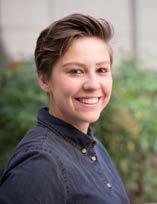
Abstract
Animal welfare is defined as how an animal is physically and mentally coping with the conditions in which it lives and dies. In order to evaluate physical and mental coping, we can use “the Five Domains” framework, where four physical domains (nutrition, environment, health, and behavior) interact to influence a fifth domain – the animal’s mental state. There are exciting opportunities to apply this framework to welfare in turkey production, such as investigating injurious pecking behavior in toms, evaluating lighting programs, using precision technologies for early detection of health issues and more. In this talk, I will review the “Five Domains” and my current and future plans to evaluate turkey welfare through my research and extension programs in the Prestage Department of Poultry Science.
9
Session 4
Session 5
Playbooks, Strategies and Tactics of Those Who Oppose Modern Agriculture Andy Curliss
Andy Curliss, MBA,CAE SAS Institute Bio

Andy Curliss is National Director of Strategic Initiatives at SAS, the global leader in advanced analytics. In his role, Andy crafts and executes strategies and solutions in support of SAS customers across the United States and serves as an adviser to company leadership. SAS is based in Cary, North Carolina, with 13,000 worldwide employees.
Prior to joining SAS, Andy was a leader in the pork industry, directing a broad range of global external and government affairs initiatives for Smithfield Foods and serving as CEO of the North Carolina Pork Council, the statewide professional and trade association of pork producers. The National Pork Board recognized Andy in 2018 with its award of appreciation for his leadership and service to the nation’s pork industry.
He also previously launched and led a public affairs and strategic communications division for a leading business-to-business marketing and communications agency, working with C-suite clients on business management and public policy issues.
For two decades prior to those roles, Andy was a journalist at The News & Observer (The N&O) of Raleigh, holding positions that focused on public policy and politics; state and local governments; and on producing high impact, revelatory reporting as an investigative reporter. His work at The N&O helped to shape numerous state and local public policies and laws, and he was recognized with more than two dozen national, regional and statewide awards, including as a finalist for the Pulitzer Prize. He was recognized multiple times with the highest annual honors given by the McClatchy Newspaper Co. and by the North Carolina Press Association.
10
In 2015, Andy was selected for a China fellowship at the East-West Center, traveling widely in China to meet with business, government and university leaders, with a particular focus on the innovative threat China poses to the U.S. He was a Japan Fellow at the International Center for Journalists in 2014. More recently, he participated in multi week study trips to Italy and Brazil that focused broadly on food and agricultural systems. Andy has been a frequent speaker and presenter at national and international conferences and meetings, and he gave the Thomas Jefferson Scholars Distinguished Lecture at NC State University in 2018.
In 2019, Andy was recognized as the Outstanding Graduate Student for all graduate-level programs at East Carolina University, where he earned his MBA with an added concentration in marketing. A native of Ohio, he earned a BA in Communications at The University of Toledo, where he was editor-in-chief of the student newspaper and inducted Omicron Delta Kappa.
Andy has volunteered in a variety of board positions and roles, including at NC State University, N.C. A&T State University, the N.C. Biotechnology Center and with several nonprofit foundations. He has served as a youth coach in sports and academic settings, including for teams of students participating in the N.C. Science Olympiad competitions at the regional and state levels.
Abstract
Well-funded outside forces are pressuring modern agricultural producers and operators in an increasingly coordinated fashion, drawing upon a range of strategies and tactics that are aimed at external disruption. A framework is provided in this talk that outlines eight distinct areas of consideration that each are critical for producers and operators to understand and consider in evaluating the external landscape. The framework provided allows for producers and operators to evaluate and consider levels of and interest in external engagement. Respecting the traditional “firm view” framework of a business, focusing primarily on employees, suppliers, customers and finance/banking relationships, remains a primary concern of producers and operators. It is just as important for producers and operators to utilize an external framework as outlined in considering external advocacy and engagement.
11
Brooding Turkey Poults Rocio Crespo
Dr. Rocio Crespo, DVM, MS, PhD, DACPV College of Veterinary Medicine, North Carolina State University
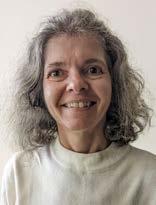
Bio
Dr. Rocio Crespo is a professor at the NC State College of Veterinary Medicine. Her research focuses on exploring ‘noninvasive or minimally invasive procedures’ to monitor poultry health, with emphasis on parasites and clinical pathology. Dr. Crespo is the current president of the American Association of Avian Pathologists and past president of the American College of Poultry Veterinarians.
Effect of Environmental Manipulations on Blood Chemistry and Performance in Turkeys Rocio Crespo and Jesse Grimes
The purpose of climate control in poultry production is to produce a healthy bird, which enables it to grow more efficiently and live in the most desirable and least stressful environment available. A good in-house climate results in lower mortality and reduced disease risk. As a rule of thumb, when the temperature of the house is above 80 °F (26.5 °C), the addition of the temperature (measured in °F) and relative humidity numbers should be less than 160, to avoid heat stress in the birds. Interestingly, poult brooder guidelines are centered on temperature only.
In mammals and humans, blood chemistry profile is essential for medical assessment. Furthermore, it is known that some analytes change to external stressors and health challenges even before obvious behavioral or clinical signs are observed. We hypothesize that analysis of selected blood parameters could aid objective assessment of the effect of environmental manipulation and performance in young growing turkeys.
The purpose of this study was to evaluate how changes in the environmental temperature and humidity affects the blood parameters and its association with the incidence of mortality, dilated cardiomyopathy, and overall turkey poult performance up to 5 weeks of age.
12
Session 6
Methodology: A total of 2,240 poults from a commercial hatchery were assigned to one of the following treatments:
Treatment Temperature Relative humidity
1 29 C (85 F) 60-70 %
2 32 C (90 F) 60-70 %
3 35 C (95 F) 60-70 %
4 38 C (95 F) 75-85 %
Ambient temperature and relative humidity were closely monitored and recorded every 30 minutes. Temperatures were lowered 5 degrees Fahrenheit each week. Blood from 12 birds, from each room, was collected on days 1, 3, 5, 7, 10, 14, 21, 28, 35. Whole heparinized blood was analyzed using an iSTAT 1 analyzer using the CG8+ cartridge. Additionally, the Freestyle Optium Neo Blood Glucose & Ketones Monitoring System to measure ketone. Statistics for all variables were performed by age by treatment.
Results: A total of 32 birds died or were culled. Most of the mortality (20 birds or 63%) died due to bacterial infection in the 2 first weeks. Interestingly 11 of them were from treatment 1. By 3 days of age, only 1 bird (treatment 3) showed signs of flip over. Other performance parameters observed in the first 2 weeks were cold and piling of birds from treatment 1; numerous poults had “angel wings” by 5 days of age (15% and 20% from treatments 3 and 4 respectively). Pendulous crop was observed at 14 days of age, in 5% and 10% of the turkeys from treatment 3 and 4 respectively
At 25 days of age, ultrasound of the heart was performed in 3 randomly selected turkeys from each room (12 birds per treatment). The hearts of 90% of the birds from treatments 3 and 4 showed severe abnormal contractility. Surprisingly, no significant gross changes were observed in any of these turkey hearts. Between 21-35 days of age, 9 turkeys were culled due to severe pecking (1, 4, 2, and 2 turkeys from treatments 1-4 respectively).
Treatment affected blood pH, partial CO2, bicarbonate (HCO3), potassium (K), ionized calcium (iCa), and glucose. Turkeys kept at the highest temperature had the higher blood pH and glucose. On the other hand, these two groups had the lower blood pCO2 and HCO3. High pH and lower pCO2 probably is due to respiratory alkalosis associated with panting. In chickens, the addition of 0.5% NaHCO3 in the diet of birds subjected to chronic heat stress enhanced body weight gain. Considerations of diet supplementation, such addition of NaHCO3 in turkeys exposed to chronic heat exposure, may help overcome some of the negative effects of heat stress. The birds exposed to higher temperature not only had higher blood glucose but also increased incidence of pendulous crop. Increased blood glucose is a common finding in heat stressed mammals due to dehydration and inability to metabolize sugar. Animals exposed to excessive heat drink more water to overcome dehydration. The increased incidence of pendulous crop in may be associated with higher water consumption.
Summary: Turkeys brooded at 90F performed better overall. Birds brooded at 80F appeared cold and succumbed more easily to bacterial infection early in life. Turkeys brooded at 95F had higher pH and glucose, and lower blood pCO2 and HCO3. Additionally, these birds had a higher incidence of angel wings, pendulous crop and functionally abnormal hearts. Analysis of troponin, a heart specific protein, is pending.
13
Turkey Reoviral Arthritis Yuko Sato
Dr. Yuko Sato,
DVM,
MS, DACPV Iowa State University Bio
Dr. Yuko Sato received her DVM in 2012 from Purdue University. She joined Iowa State University in August 2015 after completing a poultry residency and serves as the university’s Poultry Extension Veterinarian and Diagnostic Pathologist. She is a diplomate of the American College of Poultry Veterinarians since 2015. Her extension programs focus on poultry infectious disease diagnosis, prevention, and investigation. Dr. Sato is very active in scientific organizations such as the American Association of Avian Pathologists and United States American Health Association, and is a highly sought out national speaker on poultry conferences. She also serves on numerous advisory boards locally, such as the state poultry associations, as well as nationally, including the United Egg Producers scientific advisory committee.
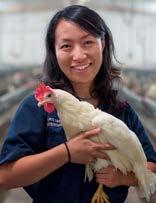
14
Session 7
Turkey Arthritis Reovirus — An insight on current findings and observations
Avian Reovirus (ARV) is considered the etiologic agent of a progressive lameness condition in turkeys, Turkey Arthritis Reovirus (TARV), that emerges most often around 10-12 weeks of age in toms and less often in hens, although younger birds are occasionally affected. There is some homology in the genotype of the avian reovirus that affects chickens, however the disease does not appear to be transmitted from chickens to turkeys and vice versa. Clinical signs and gross lesions are most severe at 15-16 weeks of age, including reluctance to move, unilateral or bilateral swelling of the hock joint and gait abnormalities. In recent years, ARV has been associated in poultry causing systemic diseases including encephalitis, hepatitis (reovirus hepatitis), enteritis and other issues which indicates that the virus, once introduced hematogenously can and will go systemic.
In 2019 the National Turkey Federation Reovirus Subcommittee released three documents to the industry, including the case definitions and nomenclature, diagnostic & testing reference listing contacts of 6 TARV researchers and the tests available and results of an industry survey titled, Economic Impact of Turkey Arthritis Reovirus. According to this report, there is an average of 5.6 cent increased cost per pound for flocks affected by TARV compared to unaffected flocks. The 2019 Survey reports approximately 2% incidence of all turkeys produced annually and primarily affects toms (approximately 5% incidence of toms produced annually). The severity of impact on the industry could be as high as $33.7 million. However, annual surveys polling turkey veterinarians on important health issues have progressively ranked TARV lower down the last few years, presuming its diminishing incidence or impact within the turkey industry.
Ongoing challenges with TARV include questions surrounding 1) pathogenesis (where does it come from?), 2) accurate diagnosis as it pertains to subtyping/serotyping to look at genetic diversity of the virus, and 3) control methods (combined efforts of breeder vaccination, commercial farm biosecurity and flock management protocols all warranted).
15
Session 8
Clostridial Dermatitis in Turkeys
Steven Clark
Dr. Steven Clark, DVM Professional Veterinary Services Manager, Turkeys HUVEPHARMA
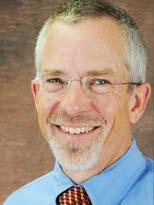
Bio
Dr. Steven Clark is a veterinarian with years of service to the poultry industry including live production and pharmaceuticals and nutrition. Dr. Clark is presently Professional Veterinary Services Manager for Huvepharma’s turkey portfolio of feed additives, anticoccidials, biologics and water-soluble antibiotics. Dr. Clark also has Diplomate ACPV, PAACO Certified Poultry Welfare Auditor and Turkey Course Master - World Veterinary Education Production Animal Health (WVEPAH, 2016). He has authored several peer reviewed publications and numerous technical bulletins and countless presentations. Dr. Clark resides in the North Carolina mountains with his wife of 35 years.
Abstract
Clostridial Dermatitis of Turkeys (CDT), also referred to as Cellulitis, remains a major disease issue across all geographic regions of the US; the annual industry 2021 survey average score for CDT changed slightly to 3.9 (from 4.0 in prior year) and increased in rank from #3 (2020) to #2. CDT is most commonly seen in, but not limited to, commercial male turkeys nearing market age. Clostridium septicum, C. perfringens type A, or C. sordelli are isolated from fluid or affected tissue samples of morbid or dead birds. Affected turkeys present with two or more of the following clinical signs: subcutaneous emphysema (crepitus); serous or serosanguineous subcutaneous fluid; vesicles on the skin, especially on the breast/inguinal area; moist, dark, wrinkled skin, especially breast/inguinal area; cellular necrosis (microscopic); organ involvement (spleen/liver); vesicles on the skin, and/or moist, dark, wrinkled skin, on the tail area. The affected flock will have mortality greater than or equal to 0.5 dead per 1,000-birds, fitting the individual bird definition, for two consecutive 24-hour periods.
16
Session 9
Grants for Poultry Production
Bill Tew
Bill Tew, Business Programs Specialist

USDA Rural Development Bio
I was born and raised in a small town in Cumberland County, North Carolina, on a small family farm. I enjoy the outdoors, camping, hiking, hunting and fishing. I graduated from Appalachian State University (ASU) with a bachelor’s in business administration and love going back up to Boone for football games. I started my career with USDA Rural Development as a “student trainee” and was brought on after college as a full-time employee. I have been with the agency for going on 17 years. I work under our Business and Cooperative program division as a business programs specialist, and serve as NC’s REAP (Rural Energy for America) coordinator. I’ve been involved with the REAP program for approximately 14 of those years and have been coordinator for five. I enjoy working with farmers and rural small businesses under the program.
Grants for Poultry Production
I will present information on our Rural Energy for America Program (REAP). I will discuss the following information:
> What type of assistance is available (Guaranteed Loans and Grants)
> Eligible applicant types (Rural Small Businesses and Farmers)
> Types of eligible projects (Energy Efficiency Improvements and Renewable Energy Systems). I will expand on these two project categories, giving examples (energy efficiency examples-lighting, insulation etc. Renewable examples-solar, wind etc.)
> I will then go into more detail on the funding availability (up to 25% grant, up to 75% guaranteed loan, 75% for a combo), loan guarantee terms (rates and terms negotiated with the lender and subject to USDA approval) and additional requirements (energy audits for efficiency projects, feasibility study for renewable system etc.).
17
Coffee Break Sponsor
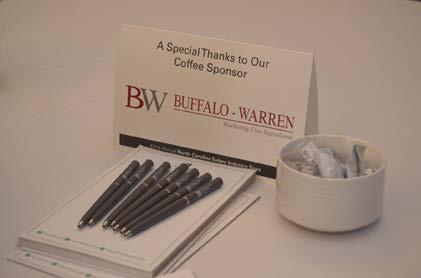

18
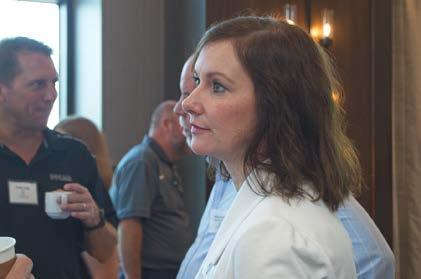
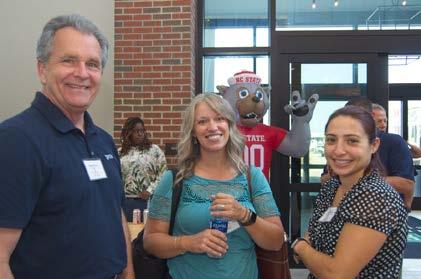
19
Gold Gobbler Sponsors




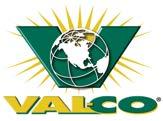
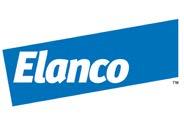


20
BEST VETERINARY SOLUTIONS, INC. QUALITY ANIMAL HEALTH & HYGIENE









21




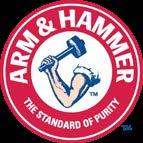





22
Silver Gobbler Sponsors
Bronze Gobbler Sponsors
23 Connect with PDPS NCStatePDPS poultry.ces.ncsu.edu/email-me go.ncsu.edu/prestage
Prestage Department of Poultry Science
2711 Founders Drive, Campus Box 7608
NC State University Raleigh, NC 27695-7608 go.ncsu.edu/prestage poultry.ces.ncsu.edu
NC State University promotes equal opportunity and prohibits discrimination and harassment based upon one’s age, color, disability,gender identity, genetic information, national origin, race, religion, sex (including pregnancy), sexual orientation and veteran status.
24






































